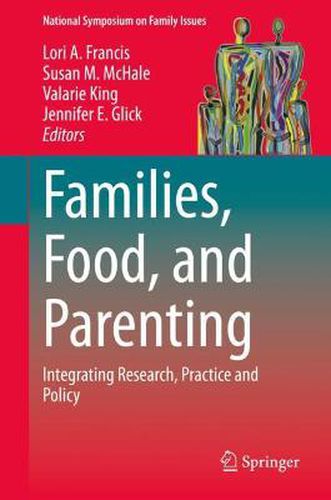Readings Newsletter
Become a Readings Member to make your shopping experience even easier.
Sign in or sign up for free!
You’re not far away from qualifying for FREE standard shipping within Australia
You’ve qualified for FREE standard shipping within Australia
The cart is loading…






This title is printed to order. This book may have been self-published. If so, we cannot guarantee the quality of the content. In the main most books will have gone through the editing process however some may not. We therefore suggest that you be aware of this before ordering this book. If in doubt check either the author or publisher’s details as we are unable to accept any returns unless they are faulty. Please contact us if you have any questions.
This book examines the many roles of families in their members’ food access, preferences, and consumption. It provides an overview of factors - from micro- to macro-levels - that have been linked to food insecurity and discusses policy approaches to reducing food insecurity and hunger. In addition, it addresses the links between food insecurity and overweight and obesity. The book describes changes in the U.S. food environment that may explain increases in obesity during recent decades. It explores relationships between parenting practices and the development of eating behaviors in children, highlighting the importance of family mealtimes in healthful eating. The volume provides an overview of efforts to prevent or reduce obesity in children, with attention to minority populations and discusses research findings on targets for obesity prevention, including a focus on fathers as change agents who play a crucial, yet understudied, role in food parenting. The book acknowledges that with the current obesigenic environment in the United States and elsewhere around the world, additional and innovative efforts are needed to foster healthful eating behavior and orientations toward food in childhood and in families.
This book is a must-have resource for researchers, professors, clinicians, professionals, and graduate students in developmental psychology, family studies, public health as well as numerous interrelated disciplines, including sociology, demography, social work, prevention science, educational policy, political science, and economics.
$9.00 standard shipping within Australia
FREE standard shipping within Australia for orders over $100.00
Express & International shipping calculated at checkout
This title is printed to order. This book may have been self-published. If so, we cannot guarantee the quality of the content. In the main most books will have gone through the editing process however some may not. We therefore suggest that you be aware of this before ordering this book. If in doubt check either the author or publisher’s details as we are unable to accept any returns unless they are faulty. Please contact us if you have any questions.
This book examines the many roles of families in their members’ food access, preferences, and consumption. It provides an overview of factors - from micro- to macro-levels - that have been linked to food insecurity and discusses policy approaches to reducing food insecurity and hunger. In addition, it addresses the links between food insecurity and overweight and obesity. The book describes changes in the U.S. food environment that may explain increases in obesity during recent decades. It explores relationships between parenting practices and the development of eating behaviors in children, highlighting the importance of family mealtimes in healthful eating. The volume provides an overview of efforts to prevent or reduce obesity in children, with attention to minority populations and discusses research findings on targets for obesity prevention, including a focus on fathers as change agents who play a crucial, yet understudied, role in food parenting. The book acknowledges that with the current obesigenic environment in the United States and elsewhere around the world, additional and innovative efforts are needed to foster healthful eating behavior and orientations toward food in childhood and in families.
This book is a must-have resource for researchers, professors, clinicians, professionals, and graduate students in developmental psychology, family studies, public health as well as numerous interrelated disciplines, including sociology, demography, social work, prevention science, educational policy, political science, and economics.